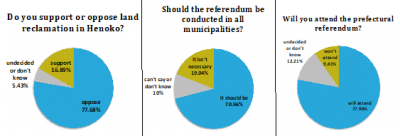Okinawa poll shows solid majority intends to attend land reclamation referendum, desires availability in all municipalities
January 4, 2019 Ryukyu Shimpo
Over the course of three days starting on December 22 last year, the Ryukyu Shimpo, the Okinawa Television Broadcasting Company (OTV), and JX PRESS Corporation conducted a telephone public opinion poll of constituents in all regions within Okinawa Prefecture. The poll asked voters whether they plan to attend the prefectural referendum concerning their support or opposition of land reclamation in Henoko, Nago City, as part of construction of a replacement facility for MCAS Futenma. When asked, 77.98 percent of respondents said they “will attend,” and 9.81 percent answered they “will not attend.” The results indicate that a high ratio of constituents intend to vote in the prefectural referendum.

Those who answered they are “undecided or do not know” if they will attend account for 12.21 percent of respondents.
When asked if the referendum should be hosted in each city, town and village, 70.96 percent said “it should be conducted in all municipalities,” outnumbering the 19.04 percent who answered “it is not necessary to conduct it” in all municipalities.
Out of those who plan to attend the referendum, a large portion of 77.68 percent said they oppose land reclamation work, and 16.89 percent said they support it. The results brought to light that even within the land reclamation support faction, there is a definite portion of people who intend to vote in the referendum.
The referendum will be conducted on February 24 this year. Still, as of Janurary 3 the mayors of Ginowan City and Miyakojima City have openly decided not to host the referendum, and the mayors of Okinawa City, Uruma City, Itoman City, and Ishigaki City are putting hosting the referendum on the backburner. Looking at the northern part of the main island, the middle and southern part of the main island, Miyakojima, and the Yaeyama Islands, the ratio of respondents who think that the referendum should be conducted in each city, town and village greatly exceeds the ratio of those who think it is unnecessary to conduct the referedum in each municipality.
When asked if the Japanese government should accept the results of the prefectural referedum, 69.04 percent said that the government “should accept the results,” and 16.83 percent said “it is unnecessary” for the government to accept the results.
Concerning the central govenment pushing forward with land reclamation work despite the Okinawa prefectural government (OPG) revoking the land reclamation permit, 24.61 percent of respondents said they “strongly support” or “somewhat support” the government’s actions. Alternatively, 68.94 percent said they “completely oppose” or “somewhat oppose” the government’s actions.
When answers from the middle and southern region of Okinawa Island are considered separately, including places like Ginowan City, Okinawa City, Uruma City, and Itoman City where it is still unclear if the referendum will be held, those who say they “will attend” the referendum account for 78.03 percent of respondents, and those who say the referendum “should be held in each municipality” account for 70.74 percent of respondents. The mayor of Miyakojima City has declared that the city will not be holding the referendum, yet in Tarama Village (within Miyakojima City) 80 percent of respondents said the referendum “should be held in each municipality.”
The poll also assessed if the prefectural referendum is common knowledge by asking respondents if they knew about the referendum. Out of respondents, 90.87 percent answered that they knew about the referendum already.
Regarding Okinawa Governor Denny Tamaki’s stance on stopping relocation of MCAS Futenma to Henoko, 74.72 percent of respondents “strongly support” or “somewhat support” his position, and 19.52 percent “completely oppose” or “somewhat oppose” it.
(English translation by T&CT and Erin Jones)
Go to Japanese
………………………………………………………………
Polling Method:
Last year over December 22, 23, and 24 the three news agencies used random digit dialing (RDD), a process by which a computer randomly generates telephone numbers and calls them, to conduct the poll. A recorded voice posed the questions. Altogether 1,687 numbers were dialed, and 1,039 people answered the poll.
Previous Article:Citizens opposing the new base shared New Year’s resolution at Henoko
Next Article:Editorial – Looking to the new year, is democracy in Japan genuine?
[Similar Articles]
- Okinawa poll finds 67.6 percent plan “no” vote in land reclamation referendum, greatly exceeding planned “yes” and “neither” votes
- Regional opinion poll reveals opposition of 58% to Henoko relocation and 68% to Futenma Air Station remaining in place
- Okinawa survey results show 61% oppose Henoko relocation, 18% support Abe administration
- About 70 percent of Okinawans including some LDP voters support OPG’s revocation of land reclamation approval
- Recent poll shows 72% of Okinawans deem Osprey “dangerous” as 68% suggest withdrawal
 Webcam(Kokusai Street)
Webcam(Kokusai Street)


